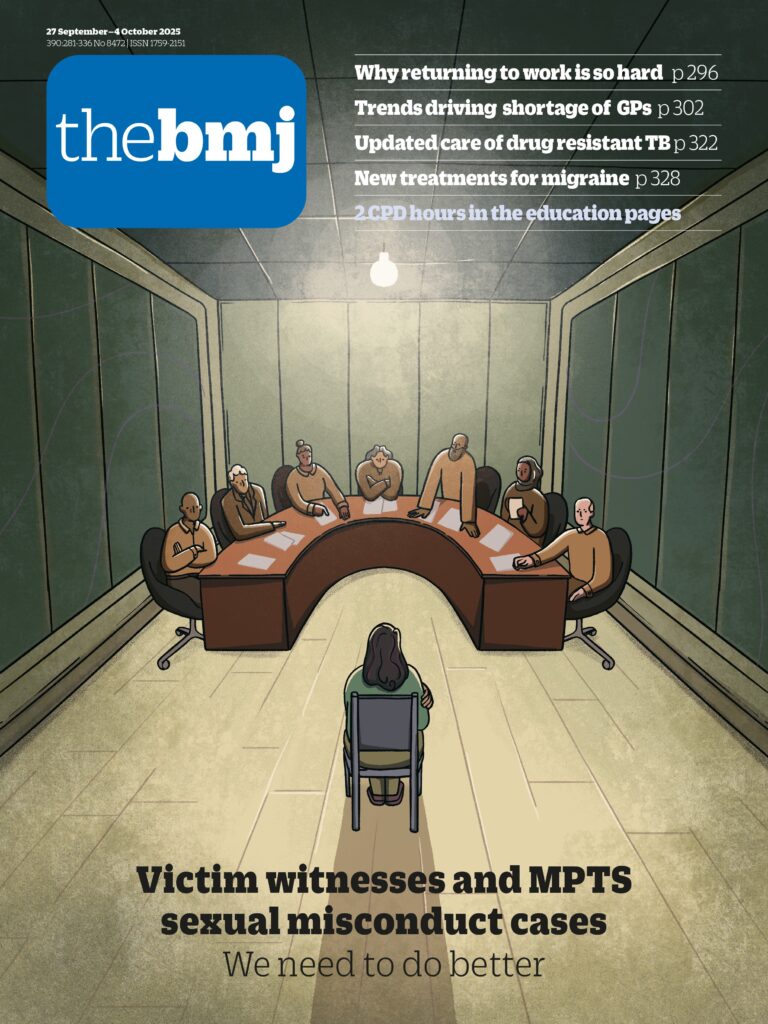Reforms to exception reporting may undermine professional values and autonomy, writes Alexander Mafi
The recent reforms to exception reporting agreed between the BMA and the government are a win for resident doctors working in NHS hospitals.1 The new policy will help to ensure that resident doctors are promptly and fairly compensated for additional hours worked above their contracted hours.2 Although these reforms will streamline processes and increase accountability among trusts, they also represent another step towards cementing a culture of shift work into UK medical practice. Exception reporting is a valuable tool, but it’s one that is best used to flag a consistent problem with ward staffing, high workloads, or personal challenges, not as a mechanism to compensate doctors for every extra minute worked. We should reflect on whether we’re sacrificing too much of our professional autonomy and workplace support mechanisms for a small financial benefit.
The new exception reporting agreement with the government has multiple strands. It extends the accountability of employers to onboard residents to reporting systems and to reimburse trainees quickly through financial penalties. It also removes the need for clinical supervisors to sign off on additional work and prompts investigations into safe staffing if a doctor reports they’ve worked more than two hours beyond their contracted end time in a single shift.
It’s easy to learn a mentality of “do nothing for free” early in our careers, from both our own experiences and those handed down from our predecessors. This is a justifiable response to a system that has historically taken advantage of doctors’ commitment to their patients while simultaneously eroding their pay. On the current trajectory of changes, however, it’s not a far-flung idea that we will soon be punching timecards in and out at every shift.
It is healthy to be able to disconnect from work between shifts and ensure that we are taking appropriate rest, but a predominant mentality of turning up to work primarily to complete contracted hours—and not one of turning up to take on responsibility for patients—could undermine our own feelings of professional purpose and value. A strong sense of responsibility to patients inevitably adds to the psychological burden of the job, but it is also deeply and intrinsically tied to the professional satisfaction of being a doctor. Resident doctors’ dwindling feelings of professional value are challenges largely driven by variable resident doctor rota patterns and lack of continuity of care and teams.3 An overemphasis on exception reporting, rather than confronting these challenges, may only serve to exacerbate the problem.
This overemphasis could also undermine doctors’ professional judgment and time management. If resident doctors consistently demand extra pay for every 15 minutes worked over their shift, trusts will be increasingly justified in pushing back if, when safe to do so, we leave work early during a quiet day. In medicine, no week is ever the same and workloads continuously fluctuate. By setting this standard, we may be sacrificing our own autonomy to manage our workloads and balance our working weeks as we see fit.
The new changes may further undermine our own support networks within hospitals. Patterns of resident doctors consistently staying late may reflect not only systemic challenges in wards or departments but also that a trainees’ educational needs aren’t being met. It’s true that having the full process of exception reporting bypass clinical supervisors will relieve supervisors and resident doctors of an administrative burden. But externalising this process may have the unintended consequence of eroding supervisors’ responsibility for our training, development, and wellbeing. This bypass risks missing any extra training or support that resident doctors may require to do their work effectively.
We must not tie ourselves into becoming expendable shift workers who are paid by the minute. Instead, we must campaign for improvements that will preserve our professionalism. These should include more responsive local feedback mechanisms for resident doctors, a stronger and more consistent voice in departmental and senior hospital management, and advocating for working patterns that foster continuity in patient care and teams. In doing so we may have a better chance at reviving the autonomy, support networks, and sense of professional responsibility that makes medicine a satisfying career.
Acknowledgments
I thank Jaya Sharma for her feedback on the article.
Footnotes
-
Competing interests: None declared.
-
Provenance and peer review: Not commissioned, not externally peer reviewed.
-
AI declaration: The author declares that the text and opinions within this article are wholly their own work; there has been no use of artificial intelligence in the preparation of the article.

